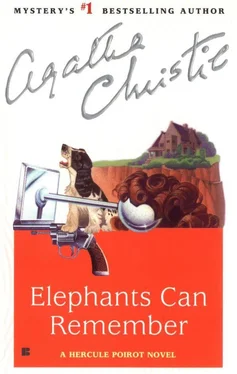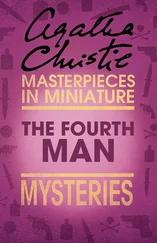Agatha Christie - Elephants Can Remember
Здесь есть возможность читать онлайн «Agatha Christie - Elephants Can Remember» весь текст электронной книги совершенно бесплатно (целиком полную версию без сокращений). В некоторых случаях можно слушать аудио, скачать через торрент в формате fb2 и присутствует краткое содержание. Год выпуска: 2004, ISBN: 2004, Издательство: Berkley, Жанр: Классический детектив, на английском языке. Описание произведения, (предисловие) а так же отзывы посетителей доступны на портале библиотеки ЛибКат.
- Название:Elephants Can Remember
- Автор:
- Издательство:Berkley
- Жанр:
- Год:2004
- ISBN:ISBN-13: 978-0425067826
- Рейтинг книги:3 / 5. Голосов: 1
-
Избранное:Добавить в избранное
- Отзывы:
-
Ваша оценка:
- 60
- 1
- 2
- 3
- 4
- 5
Elephants Can Remember: краткое содержание, описание и аннотация
Предлагаем к чтению аннотацию, описание, краткое содержание или предисловие (зависит от того, что написал сам автор книги «Elephants Can Remember»). Если вы не нашли необходимую информацию о книге — напишите в комментариях, мы постараемся отыскать её.
Elephants Can Remember — читать онлайн бесплатно полную книгу (весь текст) целиком
Ниже представлен текст книги, разбитый по страницам. Система сохранения места последней прочитанной страницы, позволяет с удобством читать онлайн бесплатно книгу «Elephants Can Remember», без необходимости каждый раз заново искать на чём Вы остановились. Поставьте закладку, и сможете в любой момент перейти на страницу, на которой закончили чтение.
Интервал:
Закладка:
"Ah. And that is what you have come to see me about."
"Yes, but I really don't know why. I mean, it's nothing to do with you and I don't think it's the sort of thing you'd even be interested in. And I'm not really interested in it. At least, I suppose I must be or I wouldn't have wanted to come to you to know what you thought. To know what-well, what you'd do if you were me."
"That is a very difficult question, that last one," said Poirot. "I know how I, Hercule Poirot, would act in anything, but I do not know how you would act, well though I know you."
"You must have some idea by this time," said Mrs. Oliver. "You've known me long enough."
"About what-twenty years now?"
"Oh, I don't know. I can never remember what years are, what dates are. You know, I get mixed up. I know nineteen thirty-nine because that's when the war started and I know other dates because of queer things, here and there."
"Anyway, you went to your literary luncheon. And you did not enjoy it very much."
"I enjoyed the lunch but it was afterwards…"
"People said things to you," said Poirot, with the kindliness of a doctor demanding symptoms.
"Well, they were just getting ready to say things to me.
Suddenly one of those large, bossy women who always manage to dominate everyone and who can make you feel more uncomfortable than anyone else, descended on me. You know, like somebody who catches a butterfly or something, only she'd have needed a butterfly net. She sort of rounded me up and pushed me on to a settee and then she began to talk to me, starting about a goddaughter of mine."
"Ah, yes. A goddaughter you are fond of?"
"I haven't seen her for a good many years," said Mrs. Oliver. "I can't keep up with all of them, I mean. And then she asked me a most worrying question. She wanted me-oh, dear, how very difficult it is for me to tell this-"
"No, it isn't," said Poirot kindly. "It is quite easy. Everyone tells everything to me sooner or later. I'm only a foreigner, you see, so it does not matter. It is easy because I am a foreigner."
"Well, it is rather easy to say things to you," said Mrs. Oliver. "You see, she asked me about the girl's father and mother. She asked me whether her mother had killed her father or her father had killed her mother,"
"I beg your pardon," said Poirot.
"Oh, I know it sounds mad. Well, I thought it was mad."
"Whether your goddaughter's mother had killed her father, or whether her father had killed her mother."
"That's right," said Mrs. Oliver.
"But-was that a matter of fact? Had her father killed her mother or her mother killed her father?"
"Well, they were both found shot," said Mrs. Oliver. "On the top of a cliff. I can't remember if it was in Cornwall or in Corsica. Something like that."
"It was true, then, what she said?"
"Oh, yes, that part of it was true. It happened years ago.
Well, but I mean-why come to me?"
"All because you were a crime writer," said Poirot. "She no doubt said you knew all about crime. This was a real thing that happened?"
"Oh, yes. It wasn't something like what would A do-or what would be the proper procedure if your mother had killed your father or your father had killed your mother. No, it was something that really happened. I suppose really I'd better tell you all about it. I mean, I can't remember all about it, but it was quite well known at the time. It was about-oh, I should think it was about twenty years ago at least. And, as I say, I can remember the names of the people because I did know them. The wife had been at school with me and I'd known her quite well. We'd been friends. It was a well-known case-you know, it was in all the papers and things like that.
Sir Alistair Ravenscroft and Lady Ravenscroft. A very happy couple and he was a colonel or a general and she'd been with him and they'd been all over the world. Then they bought this house somewhere-I think it was abroad but I can't remember. And then there were suddenly accounts of this case in the papers. Whether somebody else had killed them or whether they'd been assassinated or something, or whether they killed each other. I think it was a revolver that had been in the house for ages and-well, I'd better tell you as much as I can remember." Pulling herself slightly together, Mrs. Oliver managed to give Poirot a more or less clear resume of what she had been told. Poirot from time to time checked on a point here or there.
"But why," he said finally, "why should this woman want to know this?"
"Well, that's what I want to find out," said Mrs. Oliver, "I could get hold of Celia, I think. I mean, she still lives in London. Or perhaps it's Cambridge she lives in, or Oxford. I think she's got a degree and either lectures here or teaches somewhere, or does something like that. And-very modern, you know. Goes about with long-haired people in queer clothes.
I don't think she takes drugs. She's quite all right and-just very occasionally I hear from her. I mean, she sends a card at Christmas and things like that. Well, one doesn't think of one's godchildren all the time, and she's quite twenty-five or six.
"Not married?"
"No. Apparently she is going to marry-or that is the idea- Mrs.-what's the name of that woman again?-oh, yes, Mrs. Brittle-no-Burton-Cox's son."
"And Mrs. Burton-Cox does not want her son to marry this girl because her father killed her mother or her mother killed her father?"
"Well, I suppose so," said Mrs. Oliver. "It's the only thing I can think. But what does it matter which? If one of your parents killed the other, would it really matter to the mother of the boy you were going to marry which way round it was?"
"That is a thing one might have to think about," said Poirot. "It is-yes, you know it is quite interesting. I do not mean it is very interesting about Sir Alistair Ravenscroft or Lady Ravenscroft. I seem to remember vaguely-oh, some case like this one, or it might not have been the same one. But it is very strange about Mrs. Burton-Cox. Perhaps she is a bit touched in the head. Is she very fond of her son?"
"Probably," said Mrs. Oliver. "Probably she doesn't want him to marry this girl at all."
"Because she may have inherited a predisposition to murder the man she marries-or something of that kind?"
"How do I know?" said Mrs. Oliver. "She seems to think that I can tell her, and she's really not told me enough, has she? But why, do you think? What's behind it all? What does it mean?"
"It would be most interesting to find out," said Poirot.
"Well, that's why I've come to you," said Mrs. Oliver. "You like finding out things. Things that you can't see the reason for at first. I mean, that nobody can see the reason for."
"Do you think Mrs, Burton-Cox has any preference?" said Poirot.
"You mean that she'd rather the husband killed the wife, or the wife killed the husband? I don't think so."
"Well," said Poirot, "I see your dilemma. It is very intriguing.
You come home from a party. You've been asked to do something that is very difficult, almost impossible, and-you wonder what is the proper way to deal with such a thing."
"Well, what would you think is the proper way?" said Mrs. Oliver.
"It is not easy for me to say," said Poirot. "I'm not a woman. A woman whom you do not really know, whom you had met at a party, has put this problem to you, asked you to do it, giving no discernible reason."
"Right," said Mrs. Oliver. "Now what does Ariadne do?
What does A do, in other words, if you were reading this as a problem in a newspaper?"
"Well, I suppose," said Poirot, "there are three things that A could do. A could write a note to Mrs. Burton-Cox and say, 'I'm very sorry, but I really feel I cannot oblige you in this matter,' or whatever words you like to put. B. You get in touch with your goddaughter and you tell her what has been asked of you by the mother of the boy, or the young man, or whatever he is, whom she is thinking of marrying. You will find out from her if she is really thinking of marrying this young man. If so, whether she has any idea or whether the young man has said anything to her about what his mother has got in her head. And there will be other interesting points, like finding out what this girl thinks of the mother of the young man she wants to marry. The third thing you could do," said Poirot, "and this really is what I firmly advise you to do, is…"
Читать дальшеИнтервал:
Закладка:
Похожие книги на «Elephants Can Remember»
Представляем Вашему вниманию похожие книги на «Elephants Can Remember» списком для выбора. Мы отобрали схожую по названию и смыслу литературу в надежде предоставить читателям больше вариантов отыскать новые, интересные, ещё непрочитанные произведения.
Обсуждение, отзывы о книге «Elephants Can Remember» и просто собственные мнения читателей. Оставьте ваши комментарии, напишите, что Вы думаете о произведении, его смысле или главных героях. Укажите что конкретно понравилось, а что нет, и почему Вы так считаете.












